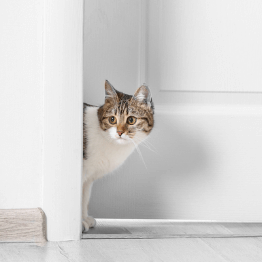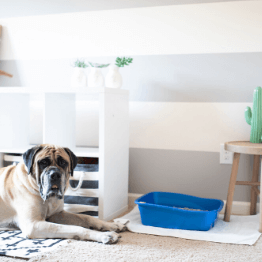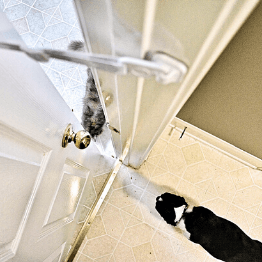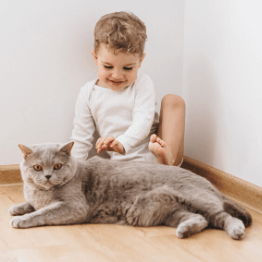IS MY CAT OVERWEIGHT? HOW TO TELL AND WHAT TO DO ABOUT IT
By: Door Buddy Editors | Published: 27 September 2024
You might love your cat's extra squishiness, but could your fluffy friend be carrying a few extra pounds? It’s tough not to spoil them with extra treats, but their health is important to consider! Just like humans, cats can face weight gain and obesity, which can impact their well-being and happiness. According to the Association for Pet Obesity, a 2022 study estimates that 61% of cats are considered obese.
So, is your cat just enjoying the laid-back life, or are you starting to wonder, is my cat overweight?
HOW TO TELL IF YOUR CAT IS OVERWEIGHT
1. Can't Feel Their Ribs
Wondering “how to know if your cat is overweight”? While petting your cat, can you easily feel their ribs? If not, there might be a little extra padding there. Cats should have a layer of fat over their ribs, but if it feels more like you're rubbing a marshmallow, it could be time to cut back on the cat treats!
It's always helps to have an overweight cat chart at the ready. This way, you can determine what healthy looks like and how many calories your pet should be consuming. Luckily, we've created one for you!

2. No Waistline
Cats are natural-born groomers, and if yours is having trouble cleaning themselves, especially around their belly or hind legs, their weight might be making it hard for them to reach.
3. Trouble Grooming
Cats are natural-born groomers, and if yours is having trouble cleaning themselves, especially around their belly or hind legs, their weight might be making it hard for them to reach.
4. Gets Winded Quickly
Does your cat get out of breath after a short play session? While it’s normal for cats to lounge, if they’re quickly exhausted after a brief chase or jump, it might be time to assess their fitness.
5. Difficulty With Activities
If your cat seems to be having a hard time with their usual cat shenanigans - like jumping onto their favorite spot on the couch or chasing after toys - it could be a sign they’re carrying a little extra weight. You might catch them taking more naps than usual (even for a cat!) or struggling to groom those hard-to-reach spots. If your feline friend is skipping out on the fun stuff, it might be time for a kitty wellness check!
5. Your Vet Has Mentioned It
If your vet has already dropped the "W" word (weight), it's probably time to start paying attention. They can help determine your cat’s ideal weight and track progress.

WHAT CAUSES OBESITY IN CATS
Obesity in cats often happens when they consume more calories than they burn. Just like with us humans, overindulging with high-calorie treats and not enough playtime can lead to extra weight on your kitty. Age and genetics can also contribute - older cats tend to be less active and may gain pounds more easily. A relaxed home with constant access to food can encourage overeating. If you're asking, 'is my cat obese?', it's essential to keep an eye on their diet and ensure they get plenty of fun activities to stay healthy!
CONSEQUENCES OF CAT OBESITY
Cat obesity might seem harmless at first, but it can lead to some serious health issues for your furry friend. Extra weight puts strain on their joints, making it harder for them to move around and increasing the risk of arthritis. Pet obesity can also lead to diabetes, heart problems, and even a shortened lifespan. Plus, those extra pounds can make it harder for your cat to groom properly, which can result in skin problems. Keeping your cat at a healthy weight is key to ensuring they live a long, happy, and active life!

WHAT TO DO IF YOUR CAT IS OVERWEIGHT
Don’t worry! There are simple, effective ways to help your cat shed those extra pounds while still keeping them happy and satisfied.
1. Measure Those Meals
Free-feeding, where food is always available, can lead to overeating. Start measuring out proper portions based on your cat’s size and activity level. Most cat food brands have feeding guidelines on the package, but your vet can also provide recommendations.
2. Pick Up The Pace With Playtime
Encourage your cat to move more by making playtime a regular part of their day! Toys like laser pointers, feather wands, or interactive puzzles will get them running, jumping, and pouncing. Check out our blog post for more great toy ideas for cats - it’s also a fantastic bonding time for both of you!

3. Switch To Weight - Control Cat Food
There are specially formulated cat foods available that can help your feline slim down. These foods are lower in calories but still packed with all the nutrients they need to stay healthy and satisfied.
Best Weight Loss Foods For Cats - Our Top Picks
4. Limit Treats
We all love spoiling our cats with treats, but they can add up quickly. Stick to low-calorie treats and make sure you aren’t going overboard. Better yet, swap treats for extra playtime!
5. Puzzle Toys And Interactive Feeders
Puzzle toys and interactive feeders are a "purr-fect" way to slow down your cat’s munching, making them feel fuller with less food! It’s like turning mealtime into a fun little brain workout.
6. Visit The Vet Regularly
If you’re concerned about your cat’s weight, your vet is your best resource. They can monitor your cat’s progress and adjust their diet or exercise plan as needed.
CONCLUSION: IS MY CAT OVERWEIGHT
Keeping your cat at a healthy weight is essential, as an overweight kitty can lead to all sorts of health issues, from diabetes to joint problems. If you’re asking, 'is my cat overweight?', it’s time to take action! Grab a toy, measure out those meals, and have fun making your kitty fitter and happier - together!









